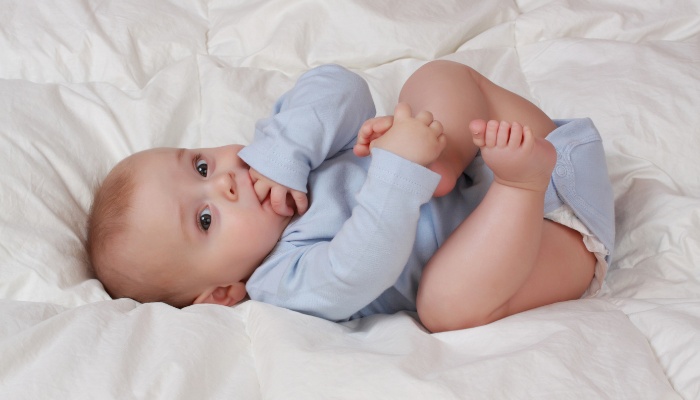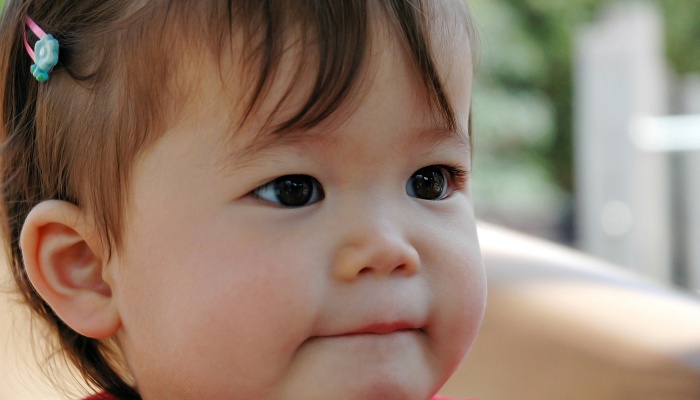During their developmental stages, infants often use their mouth as a means of discovering and experiencing the world. It is common for babies to protrude their tongues, nibble on their lips, and attempt to put everything they can grasp into their mouths.
While most of this is normal for babies, there are times to be concerned.
A baby will suck on his lip for a variety of reasons, and most of them are perfectly normal. Your child may be hungry, teething, or trying to soothe himself. This habit will usually go away on its own. If it doesn’t, you may need to work with a doctor to investigate the underlying cause.
Your baby sucking on his bottom lip happens for a ton of different reasons. Know what they are so you will know if you need to be concerned.
Reasons Behind Baby Sucking on Bottom Lip
Babies can’t use their words to tell you why they do what they do, but doctors know enough now to give us some reasons that help explain their behavior.
Self-Soothing Behavior
Babies start sucking their thumbs in the womb, so they are excellent at self-soothing from their earliest times of existence.
When they get out of the womb, they may replace their thumb with their lower lip in those early days because it’s easy to reach.
Consider this another way for them to calm themselves down when upset.
Oral Motor Development and Coordination
One reason your child may be sucking his lower lip is because he’s learning oral motor skills.
This helps him with eating and moving his mouth properly for when he will eventually make more sounds and words.
Hunger, Fatigue, or Overstimulation
Sometimes lip sucking is a sign of stress or overstimulation. Your child may also be tired and trying to self-soothe or sleep by gnawing on his lip.
If your child is chewing on his lip, you could try offering food because he may be hungry and signaling that he wants the breast or a bottle.
Imitative Behavior
Baby see, baby do! Your child will imitate behavior that she sees other people do, and that may explain why she’s chewing on her lower lip.
Adults often do this when they are nervous, stressed, or working through an issue, and your baby may just be mimicking what they see.
Teething
My babies all had a very hard time with teething. When in pain, it wasn’t uncommon for them to use their lips to try to deal with the pain.
When chewing on a bottom lip, your child may feel like they are massaging their gums when they hurt. This can feel soothing.

Is Baby Sucking on Bottom Lip Harmful?
Your baby sucking his bottom lip can be harmful if you notice certain things happening when or after he does.
Your child can definitely cause his lips to be chapped if he sucks on them too long, and this can lead to a red, irritated ring around his mouth that can get infected.
Also, your child shouldn’t continue to suck on his lip indefinitely. Children outgrow this phase, but if your child doesn’t, this could lead to buck teeth or other oral health issues.
If there are signs that your child’s lip-sucking is causing problems, get your child’s doctor or pediatric dentist involved.
When To Worry About Your Baby’s Oral Development
If your child doesn’t want to eat or gets upset if anything goes near his mouth, then you need to talk to your child’s pediatrician.
This can be a sign of oral aversion, and it can make growth harder for your child if he won’t accept food or milk.
If a child sucks on his lip constantly or does not start trying to make sounds or words at the average time most kids do, then you need to make sure oral development is on track.
Baby Self-Soothing Behaviors
Babies self-soothe in a variety of ways, and sucking their bottom lip is just one of them. They also suck their fingers or hands, put their feet in their mouth, and use a pacifier.
All of these techniques can help them calm down, though some babies have a harder time self-soothing than others.
Your child might also rock his head back and forth as he is trying to get to sleep or calm down.
Some babies even use their tiny hands to rub their faces when they are tired or trying to stay calm.
Offering Alternative Soothing Strategies
If your child’s lip-sucking is causing chapped lips or other issues, you can offer alternative methods for self-soothing.
Give your child a pacifier so they will still have something to suck on but won’t harm themselves in the process.
You can also introduce white noise if your child is prone to chewing on his lower lip when he is trying to rest. This white-noise machine/nightlight is excellent.
White noise can be very calming for babies, and your child may fall asleep faster with this background noise. This will reduce the amount of time he sucks on his lower lip.
Make sure your child is full and that his lip-sucking isn’t a sign of hunger.
Related Questions:
Why Do Babies Put Feet in Their Mouths?
Your baby puts his feet in his mouth because he found his feet! It’s a form of exploration that allows your child to learn more about his body.
Chewing on his feet may also help your baby soothe himself, much like sucking on his lower lip or thumb does.
How Do You Know When a Baby Is Stressed?
Babies show that they are stressed in a lot of different ways. Crying is one way they let you know they are having a hard time.
Babies may also stop eating and refuse to take food when it is offered. A baby may also appear lethargic or uninterested in anything around him when stressed.
Kristy is the mother of four, including identical twins. With a background in education and research, she is constantly learning more about parenting and raising multiples. When she has spare time, she enjoys hiking into the woods with a great book to take a break.


